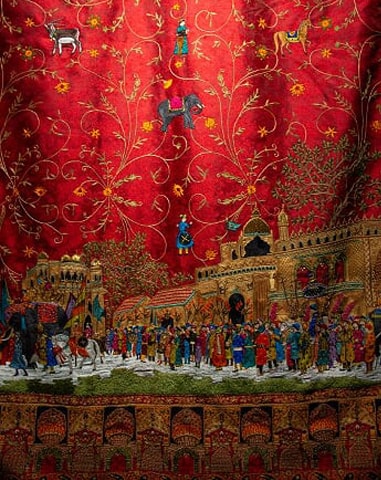
Gardens in the Islamic world are associated with a spiritual and meditative haven. The Fragrant Garden is a recently concluded exhibition at Karachi’s Koel Gallery that showcased the fascination of 15 creative minds with gardens and the benevolence of nature. The curator, Amra Ali, credited the curatorial premise to the research of Dr Ali Akbar Hussain. His work led Ali to particularly look into the references made to gardens in Deccani court poetry. She weaves the similarities between the verses and creations of artists and designers that realise nature’s bounty.
The charbagh featured in Amber Sami, Hamna Khalid and Masooma Syed’s work is a known Islamic design based on the four gardens mentioned in the Quran. It can be repeated in segments to create an intricate grid with a structured scheme. Sami embellishes her painting with handcrafted floral jewellery to reveal the parable of the garden as one of her inspirations. The beads and stones complete the scenery and reinforce the romanticised quaintness of such gardens.
Amaan Aslam renders a modular layout with a vibrant palette and portrays the lushness of ‘Jehangir’s Garden’ by including a variety of trees. The picturesque landscapes in his other works embody a dream-like state and ethereal charm.
The hand-embroidered tapestries from Bunto Kazmi’s collection are decorated with native flowers. Embroidered on one of the pieces is an elaborate scene of a wedding procession. The rich colours and the floral design accentuate the celebratory mood.
An exhibition showcases the influences of Islamic gardens on art and literature
Sumaya Durrani reminds us that paradise lies at the feet of a mother. Her deeply personal works reveal her intimate relationship with her late mother. According to Durrani, her mother was the pioneer in bridal embroidery whose main focus was to refine floral motifs. ‘Garden of Rose’, along with her mother’s possessions, and collaborative pieces with Jalaluddin Ahmed shares her response to her mother’s death and the void it left behind.

Water is a key feature in many Islamic gardens and is craftily irrigated and stored using methods much advanced for the time. Arshad Faruqi’s copper sculpture features two lily pads that levitate with the aid of a thin stem. Water dribbles out of the plants in continuum and provides an ambient sound that sedates the gallery and transports the visitors closer to nature.
Naveed Sadiq uses marbling effect to showcase a water feature in one of his artworks. He intersects the landscape with symmetrical lines and geometric shapes and situates indigenous trees to illustrate a local context.
Usman Saeed’s geometric works are an abstract representation of floral motifs. The ten-point star is a nod to Islamic geometric patterns. The astronomical constellation resembles a string of flowers and evokes balance, complexity and a symphonic infinity. They demand contemplation on the possibilities of limitless expansion.
Ustad Rafaqat Ali and Hamra Abbas draw inspiration from the floral motifs installed in several famous mosques and Islamic gardens, such as the Wazir Khan Mosque or the Alhambra Palace. While Ali uses paint and employs a traditional technique, Abbas uses marble inlay to contemporise the ornate and Arabesque aesthetics.
Noorjehan Bilgrami’s sensitive treatment in her renderings of local flowers reinforces their fragility. Layers of rice paper, gold leaf and old photographs enshrine our veneration for these flowers and retell the human dependence on the blooming jewels in Bilgrami’s works.

Meher Afroze’s equally delicate work is an aqueous surface of royal blue that is sporadically dotted with small flowers. She handwrites verses from Indo-Persian poetry to honour our bond with nature that is little acknowledged.
“The Fragrant Garden” was exhibited at Koel Gallery in Karachi from February 11 to February 29, 2020
Published in Dawn, EOS, March 8th, 2020














































Dear visitor, the comments section is undergoing an overhaul and will return soon.